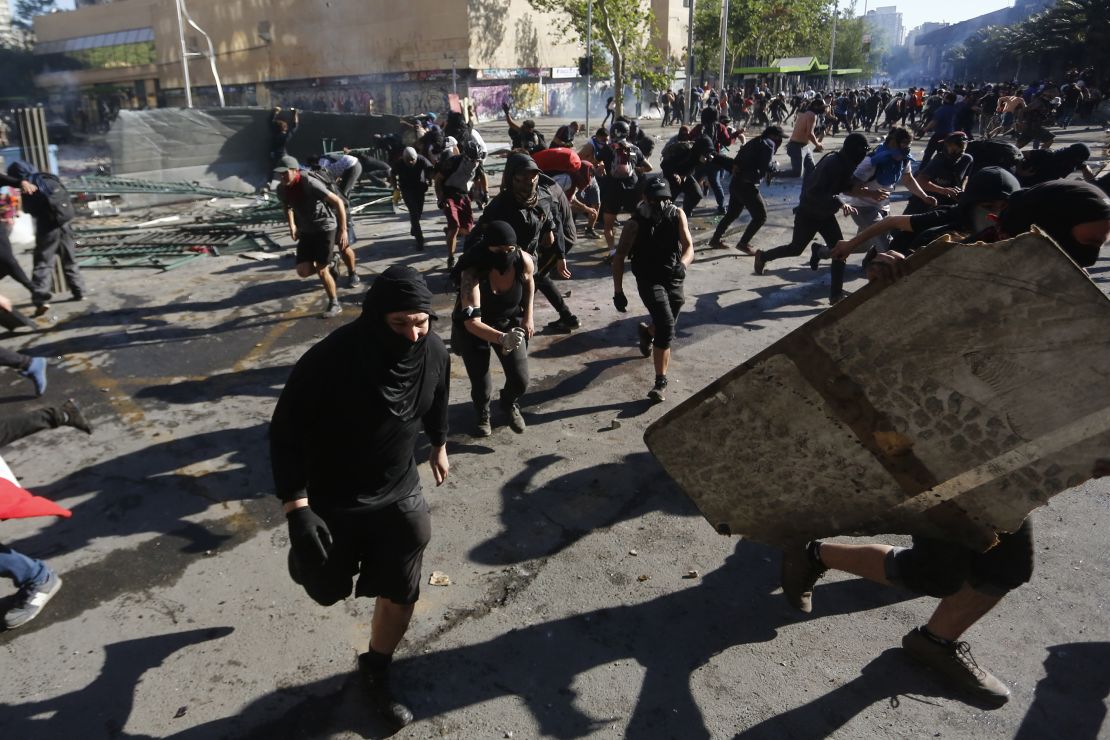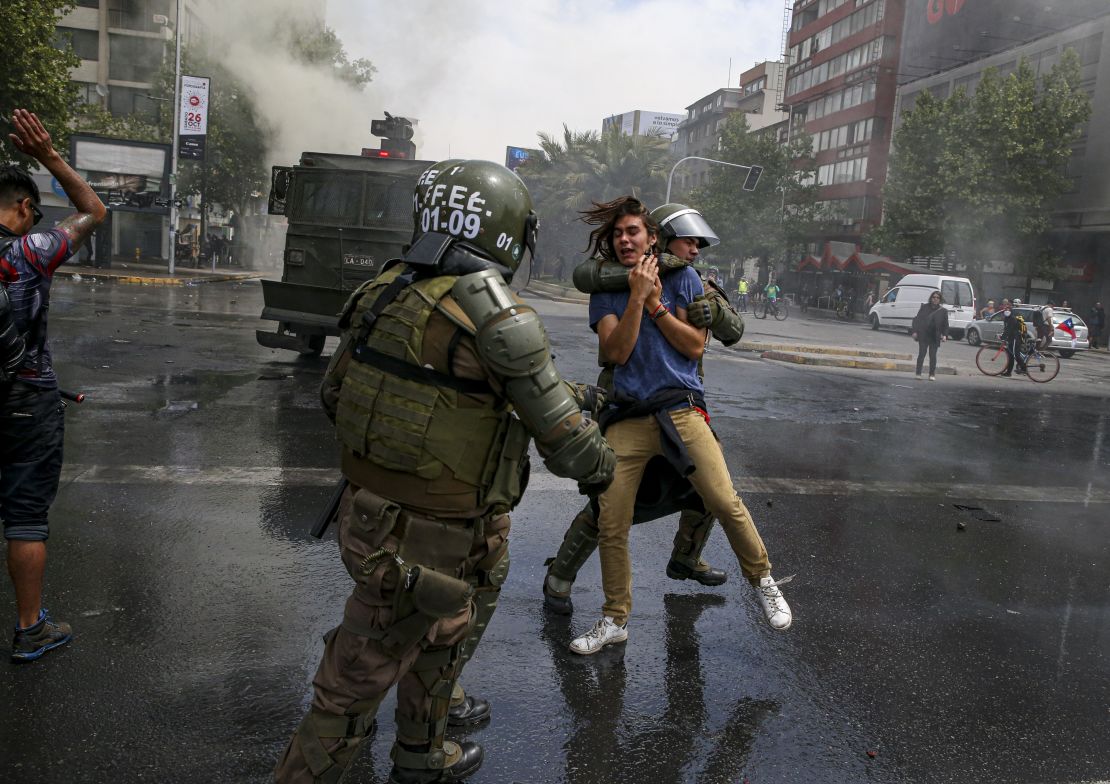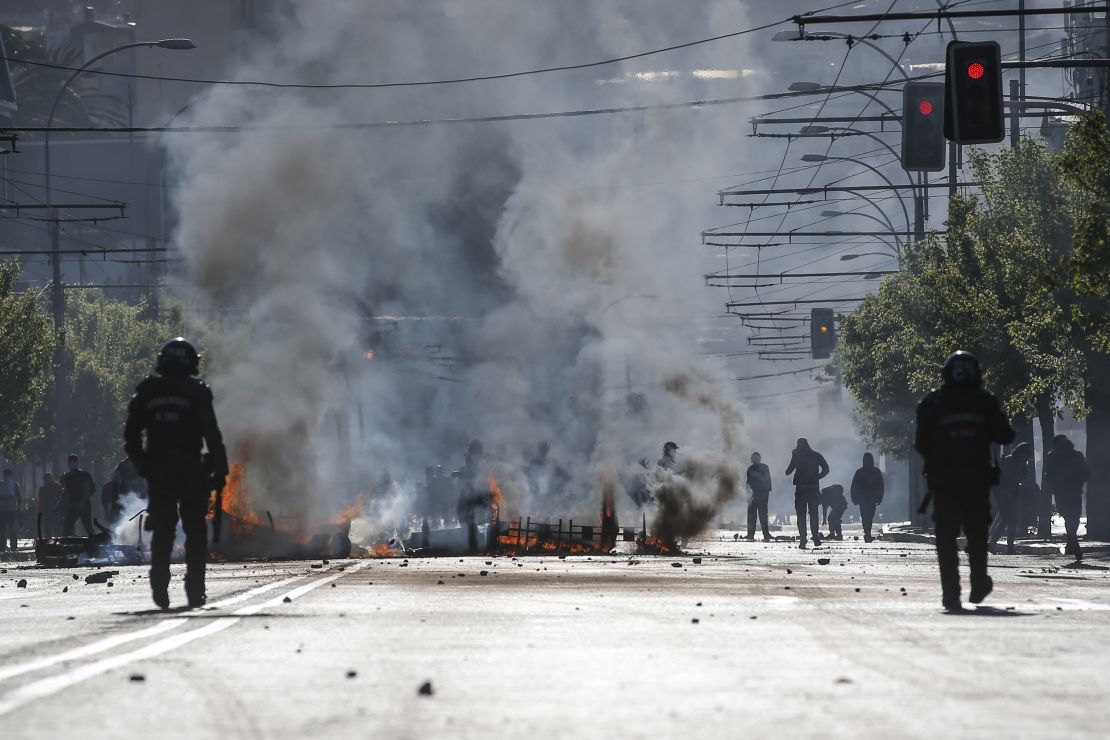Broken glass and bricks littered streets in Santiago after more violent protests Monday, prompting Chile’s government to extend a curfew in the capital for a third straight day.
Shops and business have been looted and set on fire, and metro stations vandalized and closed to the public in widespread demonstrations over economic inequalities, living costs and rising debt in the usually stable country.
Thousands of demonstrators took part in a massive protest in Santiago’s Plaza Italia Monday, banging drums and pans and calling for the ouster of conservative President Sebastian Pinera, in protests that have paralyzed one of Latin America’s biggest cities.
Clashes between protesters and security forces have led to the deaths of 15 people, with eight killed on Sunday in the deadliest day of demonstrations.
Most of the deaths were registered in Santiago and occurred during the looting and burning of the city, Undersecretary of the Interior Rodrigo Ubilla told reporters on Tuesday.
Chilean authorities said at least three foreign nationals, including two Colombian citizens and an Ecuadorian, were among the dead – a figure CNN has not independently confirmed.
Protests began eight days ago over a proposed price hike for subway tickets in the capital city Santiago but have since expanded, revealing deep-seated anger among ordinary Chileans who feel they have been excluded from the country’s economic rise.

Chile is one of Latin America’s wealthiest countries, but it also has one of highest levels of income inequality in the world.
Many jobs are informal or temporary, with young people and women among those struggling the most to find quality, skilled work. Calls for wider economic reform over a number of issues including pensions, healthcare and public education show the cracks in the country’s progress since its transition to democracy in 1990.
Pinera announced the suspension of the price hike on Saturday but it did little to quell the unrest. On Monday night, the Chilean Senate approved the cancellation of the proposed fare increase, with Senators condemning the acts of violence and calling for more unity and empathy to resolve the country’s problems.
Pinera said in a press conference Monday night that he has heard the people’s plight for a better life and insisted “violence will not prevail.” He also announced plans to meet with different groups including the opposition on Tuesday to come up with solutions for the country in crisis.
The President had previously incensed protesters by saying, “we are at war with a powerful enemy … that does respect anyone or anything.”
Military on the streets
The extended curfew, which was first introduced on Saturday, began at 8 p.m. local time (7 p.m. ET) Monday in Santiago and will end at 6 a.m. (5 a.m.ET) Tuesday October 22.
Several cities in the country have also been placed under a state of emergency as thousands have taken to the streets. The corporate headquarters of a utility company in downtown Santiago were firebombed Friday, and on Saturday, in the port city of Valparaiso, the offices of the country’s oldest newspaper, Mercurio were torched, Reuters reported.
Hundreds of flights were canceled from Santiago Airport over the weekend and schools have closed. Images on social media show long lines of people queued up outside supermarkets in the capital waiting to buy food and supplies.

The government has responded by deploying thousands of police and armed soldiers to put down the unrest – the first time the military has been deployed since Gen. Augusto Pinochet’s 17-year military dictatorship ended in 1990. Images of armored vehicles rolling down the streets of Santiago is a stark reminder of that brutal era in which nearly 2,300 people disappeared and 40,000 were tortured.
On Monday, the United Nations High Commissioner for Human Rights and former Chilean leader Michelle Bachelet urged for dialogue between protesters and authorities and called for an independent investigation into the deaths and injuries.
“There are disturbing allegations of excessive use of force by security and armed forces, and I am also alarmed by reports that some detainees have been denied access to lawyers, which is their right, and that others have been mistreated while in detention,” Bachelet said.
Citing Chile’s Ministry of Interior, Bachelet said 1,906 people have been detained since protests began.
Stable but unequal economy
In a recent report, the Organization for Economic Cooperation and Development (OECD) said that quality of life has improved for Chileans over the last few decades and the falling poverty rate is better than the United States.
But there is a chasm between the richest 10% and poorest 10% of its population. Almost a third of Chilean workers are employed in informal or non-permanent jobs, and one in two Chileans has low literacy skills, according to the OECD.
Many Chileans said they are frustrated with rising living costs, low wages and what they see is an inadequate pension system.
“This is not a simple protest over the rise of metro fares, this is an outpouring for years of oppression that have hit mainly the poorest,” Karina Sepulveda, an anthropology student, told Reuters at a protest in central Santiago on Sunday.
“The illusion of the model Chile is over. Low wages, lack of healthcare and bad pensions have made people tired.”

Others have directed their anger at the center-right billionaire President Pinera, who was photographed eating in an upmarket Italian restaurant as protests raged.
Pinera was re-elected in 2017 after governing the country from 2010 to 2014 on promises of transforming his homeland into a developed nation by 2020.
In an interview with the Financial Times a week before the protests kicked off, the President compared Chile to other countries in Latin America blighted by economic and political turmoil.
“Argentina and Paraguay are in recession, Mexico and Brazil in stagnation, Peru and Ecuador in deep political crisis and in this context Chile looks like an oasis,” said Pinera.
Santiago is set to host world leaders at the Asia-Pacific Economic Cooperation (APEC) Forum from November 11 to 17. But in what would be a blow to Chile, the unrest could threaten the summit and a highly-anticipated trade meeting between US President Donald Trump and Chinese President Xi Xinping.
CNN’s Jackie Castillo, Matt Rivers, Aimee Lewis, Daniel Silva Fernandez, Flora Charner, Florencia Trucco and Claudia Dominguez contributed.

















